2023年中考英语复习 专题九 动词的时态课件(共54张PPT)
文档属性
| 名称 | 2023年中考英语复习 专题九 动词的时态课件(共54张PPT) |

|
|
| 格式 | ppt | ||
| 文件大小 | 2.3MB | ||
| 资源类型 | 教案 | ||
| 版本资源 | 人教新目标(Go for it)版 | ||
| 科目 | 英语 | ||
| 更新时间 | 2023-06-11 00:00:00 | ||
图片预览

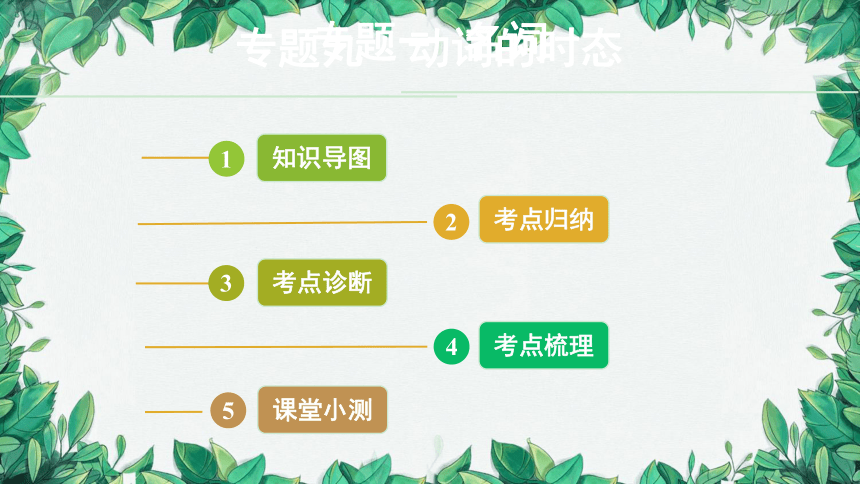
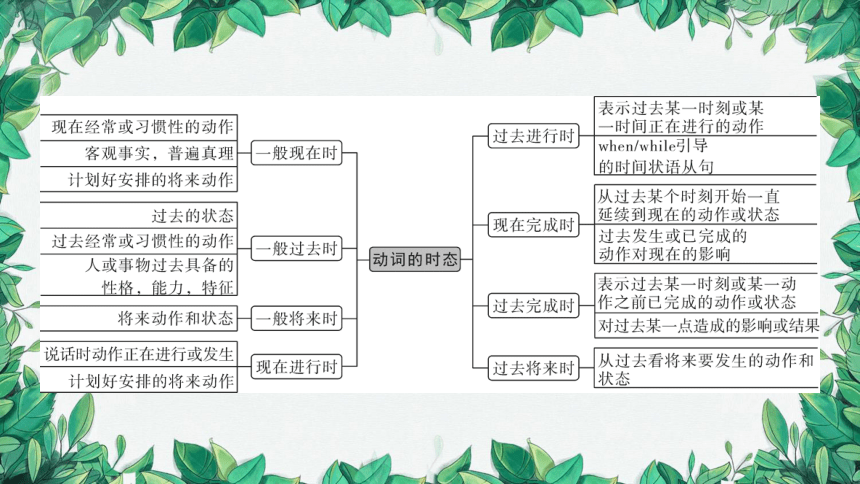
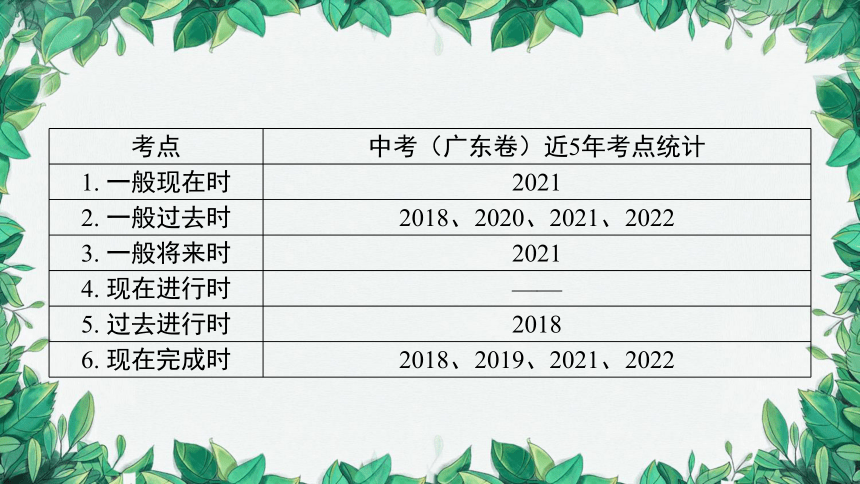
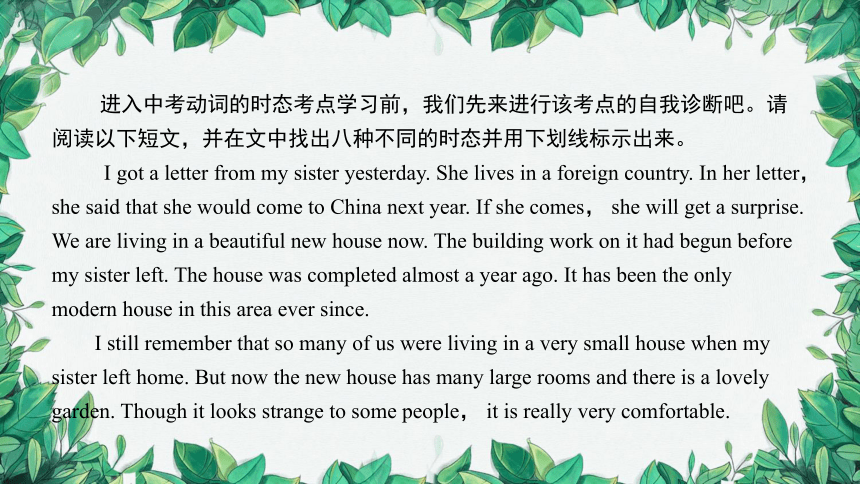
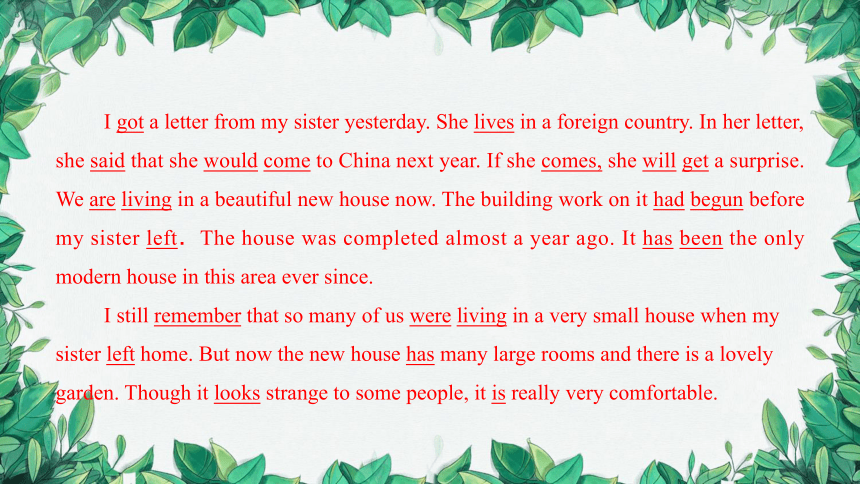
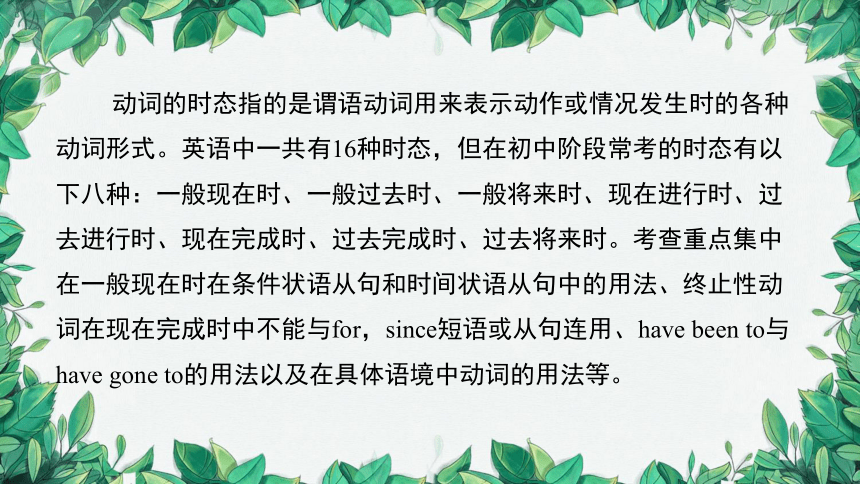
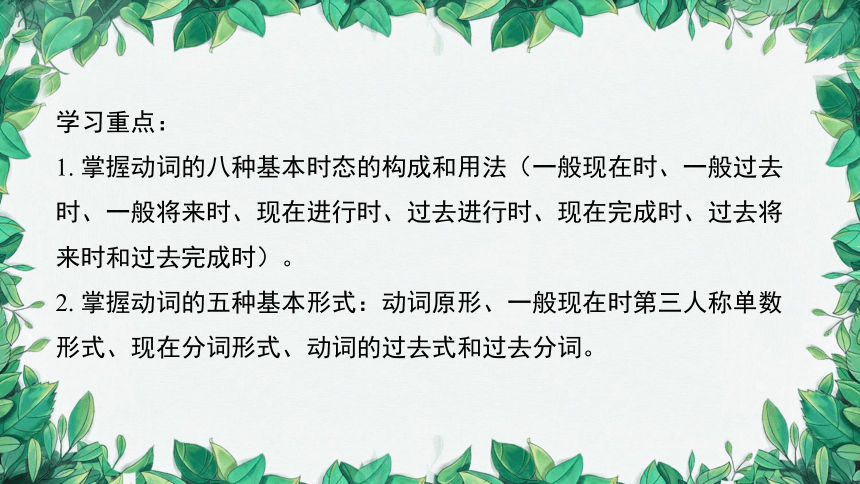
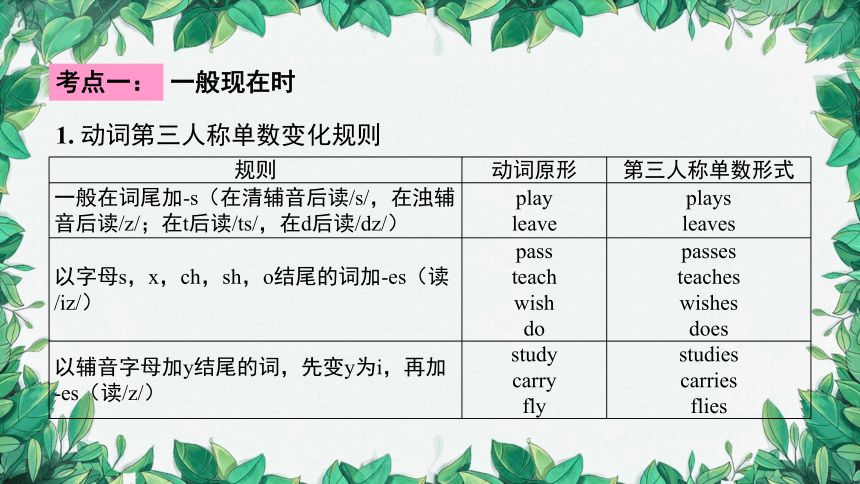
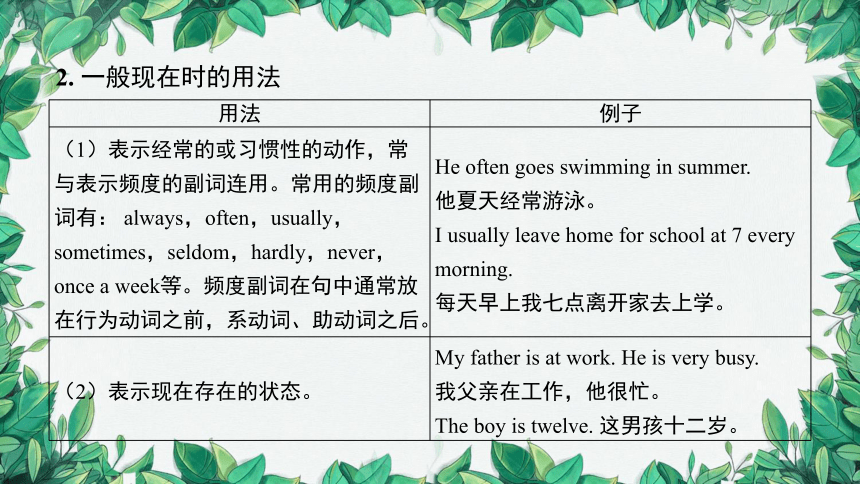
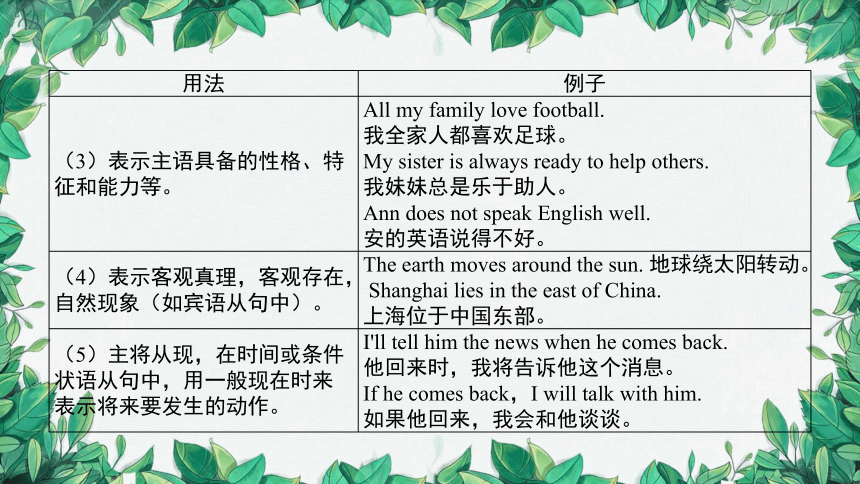
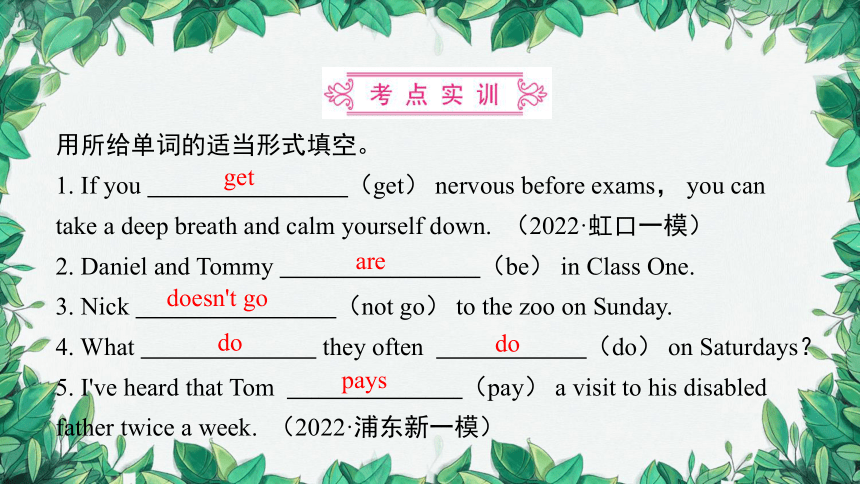
文档简介
(共54张PPT)
第一部分
语法专题训练
专题一 名词
1
知识导图
2
考点归纳
3
考点诊断
4
考点梳理
5
专题九 动词的时态
课堂小测
考点 中考(广东卷)近5年考点统计
1. 一般现在时 2021
2. 一般过去时 2018、2020、2021、2022
3. 一般将来时 2021
4. 现在进行时 ——
5. 过去进行时 2018
6. 现在完成时 2018、2019、2021、2022
进入中考动词的时态考点学习前,我们先来进行该考点的自我诊断吧。请阅读以下短文,并在文中找出八种不同的时态并用下划线标示出来。
I got a letter from my sister yesterday. She lives in a foreign country. In her letter, she said that she would come to China next year. If she comes, she will get a surprise. We are living in a beautiful new house now. The building work on it had begun before my sister left. The house was completed almost a year ago. It has been the only modern house in this area ever since.
I still remember that so many of us were living in a very small house when my sister left home. But now the new house has many large rooms and there is a lovely garden. Though it looks strange to some people, it is really very comfortable.
I got a letter from my sister yesterday. She lives in a foreign country. In her letter, she said that she would come to China next year. If she comes, she will get a surprise. We are living in a beautiful new house now. The building work on it had begun before my sister left.The house was completed almost a year ago. It has been the only modern house in this area ever since.
I still remember that so many of us were living in a very small house when my sister left home. But now the new house has many large rooms and there is a lovely garden. Though it looks strange to some people, it is really very comfortable.
动词的时态指的是谓语动词用来表示动作或情况发生时的各种动词形式。英语中一共有16种时态,但在初中阶段常考的时态有以下八种:一般现在时、一般过去时、一般将来时、现在进行时、过去进行时、现在完成时、过去完成时、过去将来时。考查重点集中在一般现在时在条件状语从句和时间状语从句中的用法、终止性动词在现在完成时中不能与for,since短语或从句连用、have been to与have gone to的用法以及在具体语境中动词的用法等。
学习重点:
1. 掌握动词的八种基本时态的构成和用法(一般现在时、一般过去时、一般将来时、现在进行时、过去进行时、现在完成时、过去将来时和过去完成时)。
2. 掌握动词的五种基本形式:动词原形、一般现在时第三人称单数形式、现在分词形式、动词的过去式和过去分词。
1. 动词第三人称单数变化规则
考点一:
一般现在时
规则 动词原形 第三人称单数形式
一般在词尾加 s(在清辅音后读/s/,在浊辅音后读/z/;在t后读/ts/,在d后读/dz/) play
leave plays
leaves
以字母s,x,ch,sh,o结尾的词加 es(读/iz/) pass
teach
wish
do passes
teaches
wishes
does
以辅音字母加y结尾的词,先变y为i,再加 es(读/z/) study
carry
fly studies
carries
flies
2. 一般现在时的用法
用法 例子
(1)表示经常的或习惯性的动作,常与表示频度的副词连用。常用的频度副词有: always,often,usually,sometimes,seldom,hardly,never,once a week等。频度副词在句中通常放在行为动词之前,系动词、助动词之后。 He often goes swimming in summer.
他夏天经常游泳。
I usually leave home for school at 7 every morning.
每天早上我七点离开家去上学。
(2)表示现在存在的状态。 My father is at work. He is very busy.
我父亲在工作,他很忙。
The boy is twelve. 这男孩十二岁。
用法 例子
(3)表示主语具备的性格、特征和能力等。 All my family love football.
我全家人都喜欢足球。
My sister is always ready to help others.
我妹妹总是乐于助人。
Ann does not speak English well.
安的英语说得不好。
(4)表示客观真理,客观存在,自然现象(如宾语从句中)。 The earth moves around the sun. 地球绕太阳转动。
Shanghai lies in the east of China.
上海位于中国东部。
(5)主将从现,在时间或条件状语从句中,用一般现在时来表示将来要发生的动作。 I'll tell him the news when he comes back.
他回来时,我将告诉他这个消息。
If he comes back,I will talk with him.
如果他回来,我会和他谈谈。
用所给单词的适当形式填空。
1. If you (get) nervous before exams, you can take a deep breath and calm yourself down. (2022·虹口一模)
2. Daniel and Tommy (be) in Class One.
3. Nick (not go) to the zoo on Sunday.
4. What they often (do) on Saturdays?
5. I've heard that Tom (pay) a visit to his disabled father twice a week. (2022·浦东新一模)
get
are
doesn't go
do
do
pays
1. 动词过去式的规则变化
考点二:
一般过去时
构成规则 动词原形 动词过去式
一般在动词原形末尾加 ed(在清辅音后读/t/;在浊辅音和元音后读/d/;在/t/,/d/后读/id/) look
play
work looked
played
worked
结尾是e的动词在末尾加 d like
live
hope liked
lived
hoped
注:不规则动词过去式参见九年级课本不规则动词表。
构成规则 动词原形 动词过去式
末尾只有一个辅音字母的重读闭音节,先双写这个辅音字母,再加 ed plan
stop
drop planned
stopped
dropped
结尾是“辅音字母+y”的动词,先变“y”为“i”再加 ed study
worry
cry studied
worried
cried
2. 一般过去时的用法
用法 例子
(1)表示过去某个时间所发生的动作或存在的状态。常和表示过去的时间状语yesterday,last week,an hour ago,just now,the other day,in 1982等连用。在一般过去时的句子中,要表达“过多少时间之后”,一般用after。 Where did you go just now?
刚才你上哪儿去了?
After a few years,she started to play the piano.
几年后,她开始弹钢琴。
(2)表示在过去,经常或反复发生的动作。常与often,always等表示频度的副词连用。 When I was a child,I often played football in the street. 我是个孩子的时候,常在马路上踢足球。
单项选择。
( )6. —Is Peter coming?
—No, he his mind after a phone call at the last minute.
A.changes B.was changing
C.has changed D.changed
D
( )7. —Have you watched the film Gulliver's Travels? (2021·扬州)
—Yes, I it during the Spring Festival. What about you?
A.watch B.watched
C.will watch D.have watched
B
( )8. Maria watch TV in her free time, but now she listening to music.
A.used to; is used to B.is used to; used to
C.used to; used to D.is used to; is used to
A
( )9. —Has Amy agreed to make a speech? I hear she's a shy girl.
—She , but she has changed.
A.used to being B.is used to being
C.used to be D.was used to be
( )10. My parents and I trees last Sunday. (2021·北京)
A.plant B.will plant
C.are planting D.planted
C
D
1. 用will+动词原形来表达将来在某一时间要发生的动作或存在的状态;当主语为第一人称时,will可用shall来替代。
2. 用be going to+动词原形来表示打算、计划去做或不久将要发生的动作。
3. 常用的时间状语(标志词)有:tomorrow(明天);next week/year(下周/明年);one day(有一天);in two days(两天后)。
考点三:
一般将来时
eg. The Olympic Games will be held in four years.
奥运会将会在四年后举行。
Lucy is going to go shopping this afternoon. 露丝打算今天下午去购物。
4. 表示往来运动的某些短暂性动词,可用现在进行时表示将来时。这类动词有:arrive,come,go,leave,fly,move等。如:
He is coming to see me next week. 他下星期将要来看我。
We are going on a field trip tomorrow. 我们明天将去郊游。
We are leaving for/flying to London. 我们将要动身前往/飞去伦敦。
一、单项选择。
( )11. Robets more heavy work for us in the future.
A. will do B.did
C.have done D.were doing
( )12. There a talk show on CCTV 4 at nine this evening.
A.will be B.are going to be
C.is going to have D.is having
A
A
( )13. —What are you saving money for?
—Father's Day is around the corner. I a gift for my father. (2022·安徽)
A.am going to buy B.have bought
C.bought D.was buying
A
二、用所给单词的适当形式填空。
14. I think I (pass) the English test tomorrow.
15. Try this cake. You (like) it!
16. Look at the clouds! It (rain).
17. He (be) twenty years old next year.
18. I (beat) you if you do that again.
will pass
will like
is going to rain
will be
will beat
现在进行时的构成:am/is/are+动词的现在分词
1. 现在分词的变化规则
考点四:
现在进行时
规则 原形 ing形式
(1)一般在动词原形末尾加 ing listen
spend
stay listening
spending
staying
(2)以不发音字母e结尾的动词,先去掉e,再加 ing have
prepare
close having
preparing
closing
规则 原形 ing形式
(3)以重读闭音节结尾的动词,如果末尾只有一个辅音字母,应先双写这个辅音字母,再加 ing sit
begin
run
put sitting
beginning
running
putting
(4)以ie为重读音节结尾的动词,把ie改为y,再加 ing lie
die lying
dying
2. 现在进行时的用法
用法 例子
(1)表示现在(指说话人说话时)正在发生或进行的动作。常与now,right now,at this moment等时间状语连用。 We are waiting for you now.
我们正在等你。
(2)表示现阶段(说话前后一段时间内),一直在进行的活动。 He is doing homework from 7 to 9.
从七点到九点他一直在做作业。
(3)表示按计划或安排要发生的动作,come,go,arrive,fly, move,leave,start,begin,return等。 I'm leaving tomorrow.
明天我要走了。
The train is arriving soon.
火车要到了。
单项选择。
( )19. —Sssh! Be quiet. I'm on the phone.
—Who you to, mom? (2022·江西)
A.do, speak B.are, speaking
C.will, speak D.have, spoke
B
( )20. The workers the community center now.
A.cleaned B.were cleaning
C.will clean D.are cleaning
( )21. We for Beijing tomorrow.
A.leave B.left
C.are leaving D.will leaves
D
C
( )22. I must leave now. My brother for me outside.
A.waits B.waited
C.is waiting D.was waiting
( )23. —Where is your father, Lily?—He in the kitchen.
A.cooked B.cooks
C.will cook D.is cooking
D
C
1. 过去进行时的构成:was/were+动词的现在分词(v. ing)
2. 过去进行时的用法
表示过去某一阶段或某一时刻正在进行的动作。常用的时间状语(标志词)有:at that time;at this time yesterday;at nine o'clock last night;when I saw him等。
eg. At this moment yesterday,I was cleaning my room.
昨天的这个时间,我正在打扫房间。
When I saw him,he was reading a book. 当我看见他时,他在看书。
考点五:
过去进行时
用所给单词的适当形式填空。
24. While we (wait) for the bus, a girl . (run) up to us.
25. At this time yesterday, I (take) a science exam here.
26. We (test) the new machine when the electricity
(go) off.
27. She (not want) to stay in bed while the others
(work) in the fields.
were waiting
ran
was taking
were testing
went
didn't want
were working
1. 现在完成时的构成:助动词have/has+动词的过去分词。
2. 过去分词的构成:
过去分词的规则变化与动词过去式的变化相同,在动词词尾加 ed;不规则变化的过去分词见九年级教科书P184~185《不规则动词表》。
考点六:
现在完成时
3. 现在完成时的用法
用法 例子
(1)表示过去发生或已经完成的动作对现在造成的影响或结果,常与already,yet,ever,never,just,before,recently, over the years, in the past/last few days,so far,twice等词连用。 Have you ever cooked at home?
你在家煮饭吗?
You have already grown much taller.
你已经长高了许多。
(2)表示过去已经开始,持续到现在的动作或状态,并可能还要延续。往往和表示一段时间的时间状语连用,常用的有:for+一段时间;since+过去时间点或从句。(since 用来说明动作起始时间,for用来说明动作延续时间长度),用how long来提问。 It has been five years since he joined the army. 他参军五年了。
They have learned English for eight years. 他们已学了八年的英语了。
4. 运用现在完成时需注意的问题:
(1)比较一般过去时与现在完成时
一般过去时表示过去某时发生的动作或存在状态,不和现在产生联系,常与具体的过去时间状语连用,如yesterday,last week,…ago,in 1980,in October,just now;现在完成时表示过去发生的某一动作对现在造成的影响或结果,强调的是现在的情况,不能与表过去的时间状语连用。
I saw this film yesterday.
昨天我看了这场电影。(强调看的动作发生了)
I have seen this film.
我已经看过这场电影。(强调对现在的影响,电影的内容已经知道了)
He joined the Party three years ago.
三年前,他加入共产党。(强调加入的动作发生了)
He has been a Party member for three years.
他成为一名党员三年了。(强调他是党员)
(2)have been to,have gone to和have been in 的区别:
have been to 去过,到过,暗含已经回来了。
have gone to 去某地了……,在去的途中或已经到达。
have been in 去了,并且在那里待下来。
He has been to Guangzhou. 他去过广州。(现在不在广州)
He has gone to Guangzhou.
他去了广州。(现在在广州或在去广州的路上)
He has been in Guangzhou for 2 days. 他待在广州两天了。
(3)延续性动词和短暂性动词之间的转化
leave—be away(from) buy—have
borrow/lend—keep die—be dead
come/get(back) —be(back) open—be open
close—be closed begin/start—be on
become/get—be arrive in(at) /get to/reach—be here/there
join the army—be in the army/be a soldier
join the League—be in the League/be a League member
marry/get married—be married
试比较:
We bought the book three years ago.
我们三年前买这本书。 We have had the book for three years.
我们买了这本书已经三年了。
I borrowed the book last week.
我上周借了这本书。 I have kept the book since last week.
我借这本书已经一周了。
His grandfather died two years ago.
他的祖父两年前去世了。 His grandfather has been dead for two years.
他的祖父去世已经两年了。
一、单项选择。
( )28. Sorry, I a mistake. Let me correct it. (2022·河北)
A.will make B.am making
C.was making D.have made
D
( )29. —What an exciting match!
—Yes, isn't it? I such a great one before!
A.never saw B.had never seen
C.never see D.have never seen
( )30. —Look at my new smart phone.
—Wow, it's so cool. When and where you it?
A.do; buy B.have; bought
C.did; buy D.have; had
D
C
( )31. We Xiao Li since she was a little girl.
A.know B.had known
C.have known D.knew
( )32. —Congratulations! You big progress in the last three years.
—Thank you, Mr. Li. I'll never forget the good times in Junior High. (2022·武汉)
A.make B.made C.have made D.will make
C
C
二、用for或since填空。
33. She has been ill more than two weeks.
34. It hasn't rained two months ago.
35. They have been my friends I was a child.
三、用have been(to), have gone(to), have been(in)填空。 36. Mike and his parents the north for half a year. 37. Mum is not at home now. She the shop.
for
since
since
have been in
has gone to
三、用have been(to), have gone(to), have been(in)填空。
38. — you ever Kunming ?
—Never.
39. —Has Jim arrived yet?
—Yes, he here for several days.
40. Hi,Jim! Where you ?
Li Lei is looking for you.
Have
been to
has been
have
been
(满分:20分) 你的得分: .
一、语法选择。(共10小题,每小题1分,共10分)
One day before going to university, a little boy asked his father, “What does the word ‘great' mean? Who are great people and how do they become great?”
The father asked his son to bring two plants and then told him to plant one of them 1 the house and the other outside the house. The boy did as his father said.
( )1. A. besides B.opposite C.inside
C
The father asked, “Which one do you think will be 2 and bigger?”
The boy replied, “The plant inside the house will be safer and it will grow bigger, while the plant outside the house is not safe at all. No one will be there to look after it. It 3 be eaten by animals. ”
( )2. A. safe B.safer C.safest
( )3. A. may B.must C.should
B
A
The father smiled and said, “Let's wait 4 . We will know the answer. ”
Then the boy 5 for study and after four years he came back. He said to his father, “Look, nothing happens to this plant inside the house and it is safe. ” When the boy went outside, he was very 6 to see a big tree. The boy couldn't believe his eyes.
( )4. A. patient B.patience C.patiently
( )5. A. leaves B.leave C.left
( )6. A. surprised B.surprisedly C.surprising
C
C
A
“The plant outside 7 house faced four seasons and many difficulties!” the father explained. “The plant inside was safe, because
8 didn't face weather changes. And it didn't get proper protection
9 it didn't become big. ”
( )7. A. the B.a C.an
( )8. A. it B.its C.itself
( )9. A. because B.so C.but
A
A
B
Here is the answer to the question about being great: 10 a great person, one must have failed many times, experienced many difficulties and overcome those difficulties. After that, he is able to become great.
( )10. A. Became B.Becoming C.To become
C
二、完形填空。(共10小题,每小题1分,共10分)
Last year my daughter, Lynn, left for university in another country. Our once lively house became quiet and 11 . I missed her so much that I started sending her messages on the phone, mainly to say
12 or to give her a word of warning.
( )11. A. dark B.clean C.lonely D.comfortable
( )12. A. hello B.sorry C.thanks D.goodbye
C
A
One of my messages says, “So you told me you 13 your credit card(信用卡). If you don't try hard to be careful, one day you’ll
14 and find your brain missing. ”
( )13. A. lost B.lent C.designed D.received
( )14. A. give up B.wake up
C.set off D.take off
A
B
I did get Lynn's messages, but most of them were about money. Recently, however, she begins to send me all kinds of articles: some funny, some touching and some worth 15 . She says they will help me understand the young better and 16 with the times.
( )15. A. copying B.writing C.thinking D.correcting
( )16. A. keep off B.keep in touch
C.keep on D.keep up
C
D
I read the articles slowly, like a 17 student, with mixed feelings as well. My kid, who followed me around not long ago, has now become my 18 .
So I wrote back. “I've read all those articles. I'll take them as a loving daughter's expectations towards her mother.
( )17. A. crazy B.popular C.nervous D.careful
( )18. A. doctor B.teacher C.customer D.classmate
D
B
She must be thinking that her mother is 19 young enough to accept new things. That makes me feel proud. What we parents lack most is the ability to learn and change, in both body and mind. Thank you, my daughter. ”
In this way we share ideas and 20 each other, with a gentle and beautiful language we seldom use. Every time I read those messages, I feel my heart filled with warmth.
( )19. A. even B.still C.just D.only
( )20. A. watch B.invite C.protect D.encourage
B
D
第一部分
语法专题训练
专题一 名词
1
知识导图
2
考点归纳
3
考点诊断
4
考点梳理
5
专题九 动词的时态
课堂小测
考点 中考(广东卷)近5年考点统计
1. 一般现在时 2021
2. 一般过去时 2018、2020、2021、2022
3. 一般将来时 2021
4. 现在进行时 ——
5. 过去进行时 2018
6. 现在完成时 2018、2019、2021、2022
进入中考动词的时态考点学习前,我们先来进行该考点的自我诊断吧。请阅读以下短文,并在文中找出八种不同的时态并用下划线标示出来。
I got a letter from my sister yesterday. She lives in a foreign country. In her letter, she said that she would come to China next year. If she comes, she will get a surprise. We are living in a beautiful new house now. The building work on it had begun before my sister left. The house was completed almost a year ago. It has been the only modern house in this area ever since.
I still remember that so many of us were living in a very small house when my sister left home. But now the new house has many large rooms and there is a lovely garden. Though it looks strange to some people, it is really very comfortable.
I got a letter from my sister yesterday. She lives in a foreign country. In her letter, she said that she would come to China next year. If she comes, she will get a surprise. We are living in a beautiful new house now. The building work on it had begun before my sister left.The house was completed almost a year ago. It has been the only modern house in this area ever since.
I still remember that so many of us were living in a very small house when my sister left home. But now the new house has many large rooms and there is a lovely garden. Though it looks strange to some people, it is really very comfortable.
动词的时态指的是谓语动词用来表示动作或情况发生时的各种动词形式。英语中一共有16种时态,但在初中阶段常考的时态有以下八种:一般现在时、一般过去时、一般将来时、现在进行时、过去进行时、现在完成时、过去完成时、过去将来时。考查重点集中在一般现在时在条件状语从句和时间状语从句中的用法、终止性动词在现在完成时中不能与for,since短语或从句连用、have been to与have gone to的用法以及在具体语境中动词的用法等。
学习重点:
1. 掌握动词的八种基本时态的构成和用法(一般现在时、一般过去时、一般将来时、现在进行时、过去进行时、现在完成时、过去将来时和过去完成时)。
2. 掌握动词的五种基本形式:动词原形、一般现在时第三人称单数形式、现在分词形式、动词的过去式和过去分词。
1. 动词第三人称单数变化规则
考点一:
一般现在时
规则 动词原形 第三人称单数形式
一般在词尾加 s(在清辅音后读/s/,在浊辅音后读/z/;在t后读/ts/,在d后读/dz/) play
leave plays
leaves
以字母s,x,ch,sh,o结尾的词加 es(读/iz/) pass
teach
wish
do passes
teaches
wishes
does
以辅音字母加y结尾的词,先变y为i,再加 es(读/z/) study
carry
fly studies
carries
flies
2. 一般现在时的用法
用法 例子
(1)表示经常的或习惯性的动作,常与表示频度的副词连用。常用的频度副词有: always,often,usually,sometimes,seldom,hardly,never,once a week等。频度副词在句中通常放在行为动词之前,系动词、助动词之后。 He often goes swimming in summer.
他夏天经常游泳。
I usually leave home for school at 7 every morning.
每天早上我七点离开家去上学。
(2)表示现在存在的状态。 My father is at work. He is very busy.
我父亲在工作,他很忙。
The boy is twelve. 这男孩十二岁。
用法 例子
(3)表示主语具备的性格、特征和能力等。 All my family love football.
我全家人都喜欢足球。
My sister is always ready to help others.
我妹妹总是乐于助人。
Ann does not speak English well.
安的英语说得不好。
(4)表示客观真理,客观存在,自然现象(如宾语从句中)。 The earth moves around the sun. 地球绕太阳转动。
Shanghai lies in the east of China.
上海位于中国东部。
(5)主将从现,在时间或条件状语从句中,用一般现在时来表示将来要发生的动作。 I'll tell him the news when he comes back.
他回来时,我将告诉他这个消息。
If he comes back,I will talk with him.
如果他回来,我会和他谈谈。
用所给单词的适当形式填空。
1. If you (get) nervous before exams, you can take a deep breath and calm yourself down. (2022·虹口一模)
2. Daniel and Tommy (be) in Class One.
3. Nick (not go) to the zoo on Sunday.
4. What they often (do) on Saturdays?
5. I've heard that Tom (pay) a visit to his disabled father twice a week. (2022·浦东新一模)
get
are
doesn't go
do
do
pays
1. 动词过去式的规则变化
考点二:
一般过去时
构成规则 动词原形 动词过去式
一般在动词原形末尾加 ed(在清辅音后读/t/;在浊辅音和元音后读/d/;在/t/,/d/后读/id/) look
play
work looked
played
worked
结尾是e的动词在末尾加 d like
live
hope liked
lived
hoped
注:不规则动词过去式参见九年级课本不规则动词表。
构成规则 动词原形 动词过去式
末尾只有一个辅音字母的重读闭音节,先双写这个辅音字母,再加 ed plan
stop
drop planned
stopped
dropped
结尾是“辅音字母+y”的动词,先变“y”为“i”再加 ed study
worry
cry studied
worried
cried
2. 一般过去时的用法
用法 例子
(1)表示过去某个时间所发生的动作或存在的状态。常和表示过去的时间状语yesterday,last week,an hour ago,just now,the other day,in 1982等连用。在一般过去时的句子中,要表达“过多少时间之后”,一般用after。 Where did you go just now?
刚才你上哪儿去了?
After a few years,she started to play the piano.
几年后,她开始弹钢琴。
(2)表示在过去,经常或反复发生的动作。常与often,always等表示频度的副词连用。 When I was a child,I often played football in the street. 我是个孩子的时候,常在马路上踢足球。
单项选择。
( )6. —Is Peter coming?
—No, he his mind after a phone call at the last minute.
A.changes B.was changing
C.has changed D.changed
D
( )7. —Have you watched the film Gulliver's Travels? (2021·扬州)
—Yes, I it during the Spring Festival. What about you?
A.watch B.watched
C.will watch D.have watched
B
( )8. Maria watch TV in her free time, but now she listening to music.
A.used to; is used to B.is used to; used to
C.used to; used to D.is used to; is used to
A
( )9. —Has Amy agreed to make a speech? I hear she's a shy girl.
—She , but she has changed.
A.used to being B.is used to being
C.used to be D.was used to be
( )10. My parents and I trees last Sunday. (2021·北京)
A.plant B.will plant
C.are planting D.planted
C
D
1. 用will+动词原形来表达将来在某一时间要发生的动作或存在的状态;当主语为第一人称时,will可用shall来替代。
2. 用be going to+动词原形来表示打算、计划去做或不久将要发生的动作。
3. 常用的时间状语(标志词)有:tomorrow(明天);next week/year(下周/明年);one day(有一天);in two days(两天后)。
考点三:
一般将来时
eg. The Olympic Games will be held in four years.
奥运会将会在四年后举行。
Lucy is going to go shopping this afternoon. 露丝打算今天下午去购物。
4. 表示往来运动的某些短暂性动词,可用现在进行时表示将来时。这类动词有:arrive,come,go,leave,fly,move等。如:
He is coming to see me next week. 他下星期将要来看我。
We are going on a field trip tomorrow. 我们明天将去郊游。
We are leaving for/flying to London. 我们将要动身前往/飞去伦敦。
一、单项选择。
( )11. Robets more heavy work for us in the future.
A. will do B.did
C.have done D.were doing
( )12. There a talk show on CCTV 4 at nine this evening.
A.will be B.are going to be
C.is going to have D.is having
A
A
( )13. —What are you saving money for?
—Father's Day is around the corner. I a gift for my father. (2022·安徽)
A.am going to buy B.have bought
C.bought D.was buying
A
二、用所给单词的适当形式填空。
14. I think I (pass) the English test tomorrow.
15. Try this cake. You (like) it!
16. Look at the clouds! It (rain).
17. He (be) twenty years old next year.
18. I (beat) you if you do that again.
will pass
will like
is going to rain
will be
will beat
现在进行时的构成:am/is/are+动词的现在分词
1. 现在分词的变化规则
考点四:
现在进行时
规则 原形 ing形式
(1)一般在动词原形末尾加 ing listen
spend
stay listening
spending
staying
(2)以不发音字母e结尾的动词,先去掉e,再加 ing have
prepare
close having
preparing
closing
规则 原形 ing形式
(3)以重读闭音节结尾的动词,如果末尾只有一个辅音字母,应先双写这个辅音字母,再加 ing sit
begin
run
put sitting
beginning
running
putting
(4)以ie为重读音节结尾的动词,把ie改为y,再加 ing lie
die lying
dying
2. 现在进行时的用法
用法 例子
(1)表示现在(指说话人说话时)正在发生或进行的动作。常与now,right now,at this moment等时间状语连用。 We are waiting for you now.
我们正在等你。
(2)表示现阶段(说话前后一段时间内),一直在进行的活动。 He is doing homework from 7 to 9.
从七点到九点他一直在做作业。
(3)表示按计划或安排要发生的动作,come,go,arrive,fly, move,leave,start,begin,return等。 I'm leaving tomorrow.
明天我要走了。
The train is arriving soon.
火车要到了。
单项选择。
( )19. —Sssh! Be quiet. I'm on the phone.
—Who you to, mom? (2022·江西)
A.do, speak B.are, speaking
C.will, speak D.have, spoke
B
( )20. The workers the community center now.
A.cleaned B.were cleaning
C.will clean D.are cleaning
( )21. We for Beijing tomorrow.
A.leave B.left
C.are leaving D.will leaves
D
C
( )22. I must leave now. My brother for me outside.
A.waits B.waited
C.is waiting D.was waiting
( )23. —Where is your father, Lily?—He in the kitchen.
A.cooked B.cooks
C.will cook D.is cooking
D
C
1. 过去进行时的构成:was/were+动词的现在分词(v. ing)
2. 过去进行时的用法
表示过去某一阶段或某一时刻正在进行的动作。常用的时间状语(标志词)有:at that time;at this time yesterday;at nine o'clock last night;when I saw him等。
eg. At this moment yesterday,I was cleaning my room.
昨天的这个时间,我正在打扫房间。
When I saw him,he was reading a book. 当我看见他时,他在看书。
考点五:
过去进行时
用所给单词的适当形式填空。
24. While we (wait) for the bus, a girl . (run) up to us.
25. At this time yesterday, I (take) a science exam here.
26. We (test) the new machine when the electricity
(go) off.
27. She (not want) to stay in bed while the others
(work) in the fields.
were waiting
ran
was taking
were testing
went
didn't want
were working
1. 现在完成时的构成:助动词have/has+动词的过去分词。
2. 过去分词的构成:
过去分词的规则变化与动词过去式的变化相同,在动词词尾加 ed;不规则变化的过去分词见九年级教科书P184~185《不规则动词表》。
考点六:
现在完成时
3. 现在完成时的用法
用法 例子
(1)表示过去发生或已经完成的动作对现在造成的影响或结果,常与already,yet,ever,never,just,before,recently, over the years, in the past/last few days,so far,twice等词连用。 Have you ever cooked at home?
你在家煮饭吗?
You have already grown much taller.
你已经长高了许多。
(2)表示过去已经开始,持续到现在的动作或状态,并可能还要延续。往往和表示一段时间的时间状语连用,常用的有:for+一段时间;since+过去时间点或从句。(since 用来说明动作起始时间,for用来说明动作延续时间长度),用how long来提问。 It has been five years since he joined the army. 他参军五年了。
They have learned English for eight years. 他们已学了八年的英语了。
4. 运用现在完成时需注意的问题:
(1)比较一般过去时与现在完成时
一般过去时表示过去某时发生的动作或存在状态,不和现在产生联系,常与具体的过去时间状语连用,如yesterday,last week,…ago,in 1980,in October,just now;现在完成时表示过去发生的某一动作对现在造成的影响或结果,强调的是现在的情况,不能与表过去的时间状语连用。
I saw this film yesterday.
昨天我看了这场电影。(强调看的动作发生了)
I have seen this film.
我已经看过这场电影。(强调对现在的影响,电影的内容已经知道了)
He joined the Party three years ago.
三年前,他加入共产党。(强调加入的动作发生了)
He has been a Party member for three years.
他成为一名党员三年了。(强调他是党员)
(2)have been to,have gone to和have been in 的区别:
have been to 去过,到过,暗含已经回来了。
have gone to 去某地了……,在去的途中或已经到达。
have been in 去了,并且在那里待下来。
He has been to Guangzhou. 他去过广州。(现在不在广州)
He has gone to Guangzhou.
他去了广州。(现在在广州或在去广州的路上)
He has been in Guangzhou for 2 days. 他待在广州两天了。
(3)延续性动词和短暂性动词之间的转化
leave—be away(from) buy—have
borrow/lend—keep die—be dead
come/get(back) —be(back) open—be open
close—be closed begin/start—be on
become/get—be arrive in(at) /get to/reach—be here/there
join the army—be in the army/be a soldier
join the League—be in the League/be a League member
marry/get married—be married
试比较:
We bought the book three years ago.
我们三年前买这本书。 We have had the book for three years.
我们买了这本书已经三年了。
I borrowed the book last week.
我上周借了这本书。 I have kept the book since last week.
我借这本书已经一周了。
His grandfather died two years ago.
他的祖父两年前去世了。 His grandfather has been dead for two years.
他的祖父去世已经两年了。
一、单项选择。
( )28. Sorry, I a mistake. Let me correct it. (2022·河北)
A.will make B.am making
C.was making D.have made
D
( )29. —What an exciting match!
—Yes, isn't it? I such a great one before!
A.never saw B.had never seen
C.never see D.have never seen
( )30. —Look at my new smart phone.
—Wow, it's so cool. When and where you it?
A.do; buy B.have; bought
C.did; buy D.have; had
D
C
( )31. We Xiao Li since she was a little girl.
A.know B.had known
C.have known D.knew
( )32. —Congratulations! You big progress in the last three years.
—Thank you, Mr. Li. I'll never forget the good times in Junior High. (2022·武汉)
A.make B.made C.have made D.will make
C
C
二、用for或since填空。
33. She has been ill more than two weeks.
34. It hasn't rained two months ago.
35. They have been my friends I was a child.
三、用have been(to), have gone(to), have been(in)填空。 36. Mike and his parents the north for half a year. 37. Mum is not at home now. She the shop.
for
since
since
have been in
has gone to
三、用have been(to), have gone(to), have been(in)填空。
38. — you ever Kunming ?
—Never.
39. —Has Jim arrived yet?
—Yes, he here for several days.
40. Hi,Jim! Where you ?
Li Lei is looking for you.
Have
been to
has been
have
been
(满分:20分) 你的得分: .
一、语法选择。(共10小题,每小题1分,共10分)
One day before going to university, a little boy asked his father, “What does the word ‘great' mean? Who are great people and how do they become great?”
The father asked his son to bring two plants and then told him to plant one of them 1 the house and the other outside the house. The boy did as his father said.
( )1. A. besides B.opposite C.inside
C
The father asked, “Which one do you think will be 2 and bigger?”
The boy replied, “The plant inside the house will be safer and it will grow bigger, while the plant outside the house is not safe at all. No one will be there to look after it. It 3 be eaten by animals. ”
( )2. A. safe B.safer C.safest
( )3. A. may B.must C.should
B
A
The father smiled and said, “Let's wait 4 . We will know the answer. ”
Then the boy 5 for study and after four years he came back. He said to his father, “Look, nothing happens to this plant inside the house and it is safe. ” When the boy went outside, he was very 6 to see a big tree. The boy couldn't believe his eyes.
( )4. A. patient B.patience C.patiently
( )5. A. leaves B.leave C.left
( )6. A. surprised B.surprisedly C.surprising
C
C
A
“The plant outside 7 house faced four seasons and many difficulties!” the father explained. “The plant inside was safe, because
8 didn't face weather changes. And it didn't get proper protection
9 it didn't become big. ”
( )7. A. the B.a C.an
( )8. A. it B.its C.itself
( )9. A. because B.so C.but
A
A
B
Here is the answer to the question about being great: 10 a great person, one must have failed many times, experienced many difficulties and overcome those difficulties. After that, he is able to become great.
( )10. A. Became B.Becoming C.To become
C
二、完形填空。(共10小题,每小题1分,共10分)
Last year my daughter, Lynn, left for university in another country. Our once lively house became quiet and 11 . I missed her so much that I started sending her messages on the phone, mainly to say
12 or to give her a word of warning.
( )11. A. dark B.clean C.lonely D.comfortable
( )12. A. hello B.sorry C.thanks D.goodbye
C
A
One of my messages says, “So you told me you 13 your credit card(信用卡). If you don't try hard to be careful, one day you’ll
14 and find your brain missing. ”
( )13. A. lost B.lent C.designed D.received
( )14. A. give up B.wake up
C.set off D.take off
A
B
I did get Lynn's messages, but most of them were about money. Recently, however, she begins to send me all kinds of articles: some funny, some touching and some worth 15 . She says they will help me understand the young better and 16 with the times.
( )15. A. copying B.writing C.thinking D.correcting
( )16. A. keep off B.keep in touch
C.keep on D.keep up
C
D
I read the articles slowly, like a 17 student, with mixed feelings as well. My kid, who followed me around not long ago, has now become my 18 .
So I wrote back. “I've read all those articles. I'll take them as a loving daughter's expectations towards her mother.
( )17. A. crazy B.popular C.nervous D.careful
( )18. A. doctor B.teacher C.customer D.classmate
D
B
She must be thinking that her mother is 19 young enough to accept new things. That makes me feel proud. What we parents lack most is the ability to learn and change, in both body and mind. Thank you, my daughter. ”
In this way we share ideas and 20 each other, with a gentle and beautiful language we seldom use. Every time I read those messages, I feel my heart filled with warmth.
( )19. A. even B.still C.just D.only
( )20. A. watch B.invite C.protect D.encourage
B
D
同课章节目录
- 词法
- 名词
- 动词和动词短语
- 动词语态
- 动词时态
- 助动词和情态动词
- 非谓语动词
- 冠词
- 代词
- 数词和量词
- 形容词副词及其比较等级
- 介词和介词短语
- 连词和感叹词
- 构词法
- 相似、相近词比较
- 句法
- 陈述句
- 一般疑问句和否定疑问句
- 特殊疑问句及选择疑问句
- 反意疑问句
- 存在句(There be句型)
- 宾语从句
- 定语从句
- 状语从句
- 主谓一致问题
- 简单句
- 并列句
- 复合句
- 主谓一致
- 主、表语从句
- 名词性从句
- 直接引语和间接引语
- 虚拟语气
- 感叹句
- 强调句
- 倒装句
- 祈使句
- 句子的成分
- 句子的分类
- 题型专区
- 单项选择部分
- 易错题
- 完形填空
- 阅读理解
- 词汇练习
- 听说训练
- 句型转换
- 补全对话
- 短文改错
- 翻译
- 书面表达
- 任务型阅读
- 语法填空
- 其他资料
